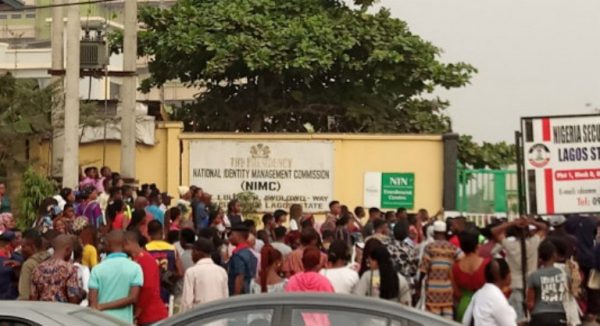
By Ayoola Olaitan
Despite the corrupt practices, lack of capacity and numerous challenges that have deprived the National Identity Management Commission (NIMC) from achieving a harmonized database for the nation, the Federal Government has chosen to keep a blind eye to them and urged the Nigerian Communications Commission, (NCC) to enforce a policy of compulsory National Identification Number(NIN) enrolment by blocking subscribers’ SIM cards.
The public reactions to this directive have been mixed though, it has been punctuated by condemnations and derisive emotions which portray government as unserious.
This development simply suggests that NIMC is not only incapable of exploring a seamless method by which the National Identity Management System(NIMS) could be managed but also made a bold statement that NIMC has failed as a Commission with the preoccupation of delivering a common digital database for national identity management.
NIMC is the statutory government agency that operates and regulates matters of national identity in Nigeria with services covering NIN enrolment and issuance, National e-ID card issuance, identity verification as well as data harmonization and authentication.

Founded 13 years ago in 2007, NIMC has not made any success in its brief or galvanized sister agencies of the government as partners or effectively deployed the private sector as agents to help realize its objective of a harmonized digital identity database for the nation.
According to a statement by NCC, issued last week, the Minister of Communications and the Digital Economy, Dr Isa Pantami, has given until December 30, 2020, for subscribers to update their details or risk being blocked.
Nigerians have frowned at the directive as wrongly timed given that the world is faced with a global pandemic known as Covid-19, which makes it socially ill-advised for people to troupe out and engage in mass enrolment at close range with the certainty of standing for long hours and days in wait for turns at few registration centers without capacities across the country.
The consequence here is a spike in the number of C-19 cases even as government makes efforts to curb the spread of the pandemic.
There is also the argument that the directive could trigger stampedes at the few registration centres, leading to injuries or deaths and coming at this yuletide season is a kill joy for many especially against the background that many people have left their base and will not be back until January 2021. There is also low publicity of the directive as many Nigerians do not read national dailies.
In Nigeria, there is no age limit for SIM registration, as teenagers, children and aged adults can own SIM card at any time, a factor that has also invalidated whatever reason or logic behind the sudden directive.
Meanwhile, the House of Representatives, (HoR), last Wednesday, instructed NCC to extend the deadline for the re-registration of all SIM cards in Nigeria, till February 2021.
This disposition by HoR, needs to be questioned as the arm of government failed to do the needful, which is clamoring for the harmonization of the national identity management system rather than seeking the extension of the directive’s deadline.
Over the years, many government agencies have been involved in data collection of citizens in many areas with finger prints inclusive. FRSC collects data for driver’s
Licence, Central Bank of Nigeria(CBN) uses commercial banks to generate Bank Verification Numbers(BVN), Independent National Electoral Commission(INEC) issues voter’s card with personal data, NCC uses the telecommunication companies to get subscriber’s personal data, Nigerian Immigration Service(NIS) gets personal data for international passport issuance and then NIMC for NIN. All these, come with various forms of e-ID and a hard copy.
The question now is, why has it been difficult to have a harmonized digital identity operating system that can make it difficult for duplication of any sort with a thumb or finger prints on any of the agencies’ platforms? This model will ensure that as a person places his or her thumb print on the surface of the data capturing system, it will display all the personal data earlier imputed, while displaying the new areas needed to capture for the given purpose of the data capture. For birth certification and death, all clinics and hospital must be made national identity system compliant digitally such that when someone dies and it is imputed the system deletes the deceased’s personal data automatically.
The model makes it possible for every citizen that has attained the age of voting to be automatically issued an e-voter’s card on regular basis.
As a result of this directive on the harmonization of citizens’ data, the Federal Road Safety Corps (FRSC) has said from December 21 all applicants for the driver’s license must present the NIN.
Meanwhile, the NCC is yet to explain how millions of users will be able to comply with the new directives within the stipulated time. What happens to other unique numbers that have been given? Where are the personal data collected by different agencies of government stored?
The new directive has also caused the suspension of registration of new SIM cards nationwide and Nigerians with existing SIM cards have also been directed to update their SIM registration details with their NIN.
In October 2020, the NCC said there were over 152 million Internet subscribers in the country, while NIMC claims that about 42 million Nigerians already had NIN as of September 2020, out of the current population of about 206million people in the country.
Meanwhile,as the nation is yet to settle on the direction to go on the new directive, telecommunication companies have begun to trample on citizens, extorting and violating directives of the NCC by rolling out frivolous charges without prior notice, earning huge amounts of money in the last few days.
But in a swift reaction, last week, Friday, the Federal Government ordered all network providers to cancel the N20 charge for the retrieval of the NIN with immediate effect.
Speaking with MMS Plus on the need for the public to provide the NIN during registration for the processing of their driver’s license, the Public Education Officer of the Federal Road Safety Corps (FRSC), Assistant Corps Marshal, Bisi Kazeem, said that the NIN is mandatory in renewal or processing of driver’s license from December 21, 2020.
He hinted that without the NIN renewal or processing of license could not be done and such a driver can’t drive on Nigerian roads.
Kazeem argued that the NIN is not a duplication of information as it entails different information about the driver and serves it own clear purpose.
According to him, “it is not duplication of information, information on the NIN is different from information collected to process the driver’s license. The NIN is compulsory for every citizen of Nigeria to have and the earlier citizens begin to comply the better”.
Kazeem condemned the attitude of waiting till the last minute before doing what is necessary, “government has talked about harmonizing of database and people are shying away from it”
“We Nigerians like to wait for the last minute before doing the needful, if the needful had been done early enough there won’t be need for panic”.
Speaking with MMS Plus, a shop owner who gave his name as Adeshina Kehinde, posits that the timing for such directive by the government is wrong considering the daily increase in the pandemic and the process being plagued by several difficulties which are yet to be resolved.
According to him, “the directive by the government is a reflection of unfairness on the part of the government. Looking at the timing, it is just not fair on us as citizens of this country. We are currently experiencing the second wave of the pandemic, government ought to look for ways to curb the spread rather than giving directives that will increase the cases”
Adeshina lamented the pain he encountered in the course of getting enrolled into the system, saying that the institution had not done well. He also pointed out that there is extortion by officials during registration.
Also, the creative director of Infinity Media, Olasupo Emmanuel posits that government ought to harmonize the database through the established platforms, such as BVN, driver’s license and voter’s card.
He however, argued that preparation by the NCC is not good enough to get results for such directives within the time given, adding that extortion, waste of human efforts and numerous challenges as bottleneck during enrolment.
According to him, “I had my registration at the Oshodi/Isolo local government, it lasted me three whole days and I had to skip work to get it done because I was having issues with my bank. I got to the registration point at least before 6am just to try get this done”
“Some people who do not have the opportunity of skipping work had to pay as much as 5,000 to be able to get it done on time, in a day they might not even get to register up to 20 persons because of the system’s network challenge,” he added.
NIMC claimed, however, to have licensed 203 agents nationwide to enroll 206 million people without providing information of the human or equipment capacities of the agents. It is very obvious that these agents have not done their job well following the huge deficit in enrolment figure and the malfeasance arising from the operation.
This no doubt calls for another level of collaboration among the agencies and harmonization, which is the need for NIMC to explore using the telecom companies’ agents found everywhere across the country as well as the commercial banks and their BVN registration operating system.
 MMS PLUS NG – Maritime, Aviation, Business, Oil and Gas News Online Newspaper with coverage in Maritime, Oil and Gas, Aviation, Power and Energy as well as Financial News
MMS PLUS NG – Maritime, Aviation, Business, Oil and Gas News Online Newspaper with coverage in Maritime, Oil and Gas, Aviation, Power and Energy as well as Financial News









